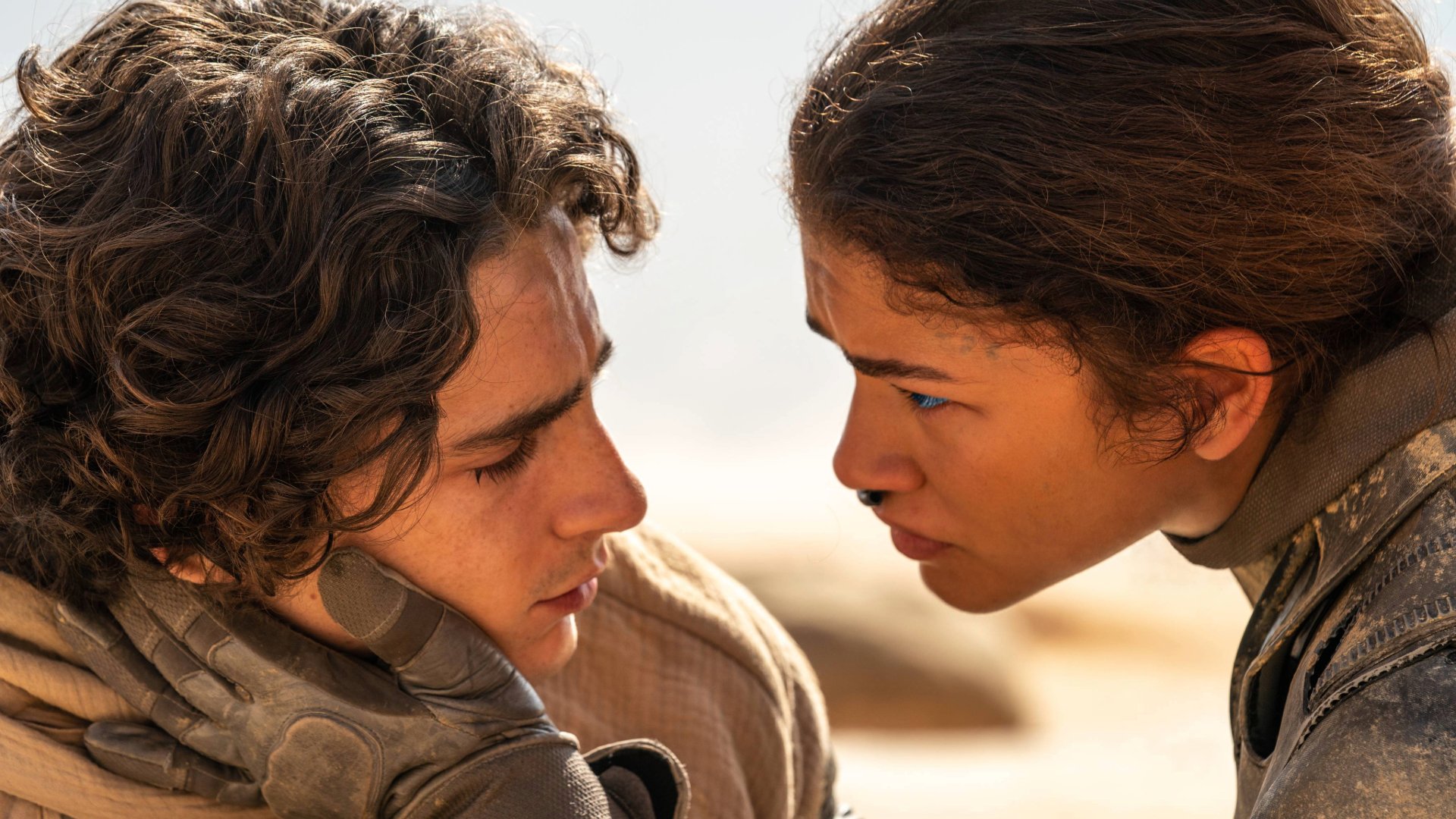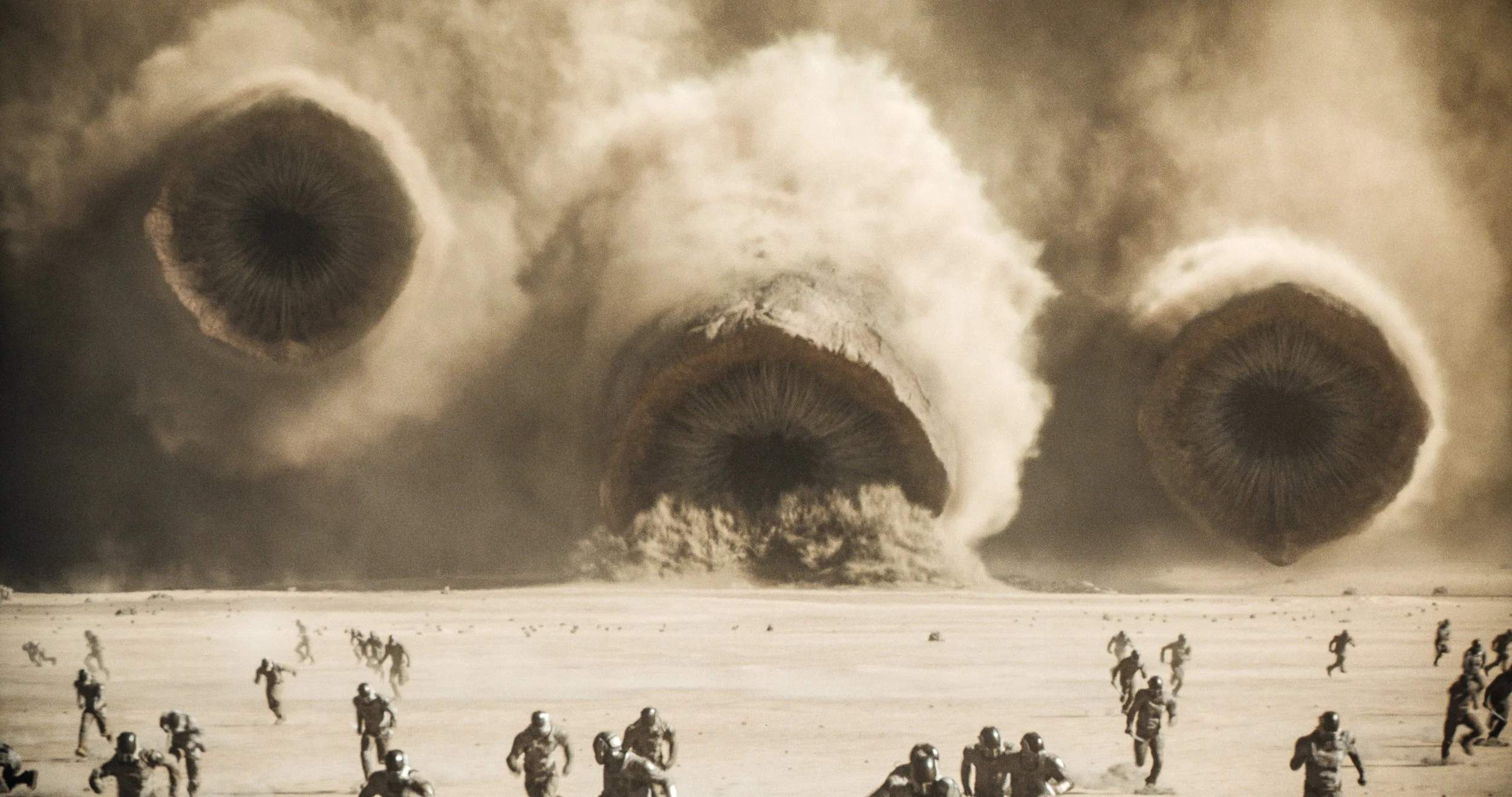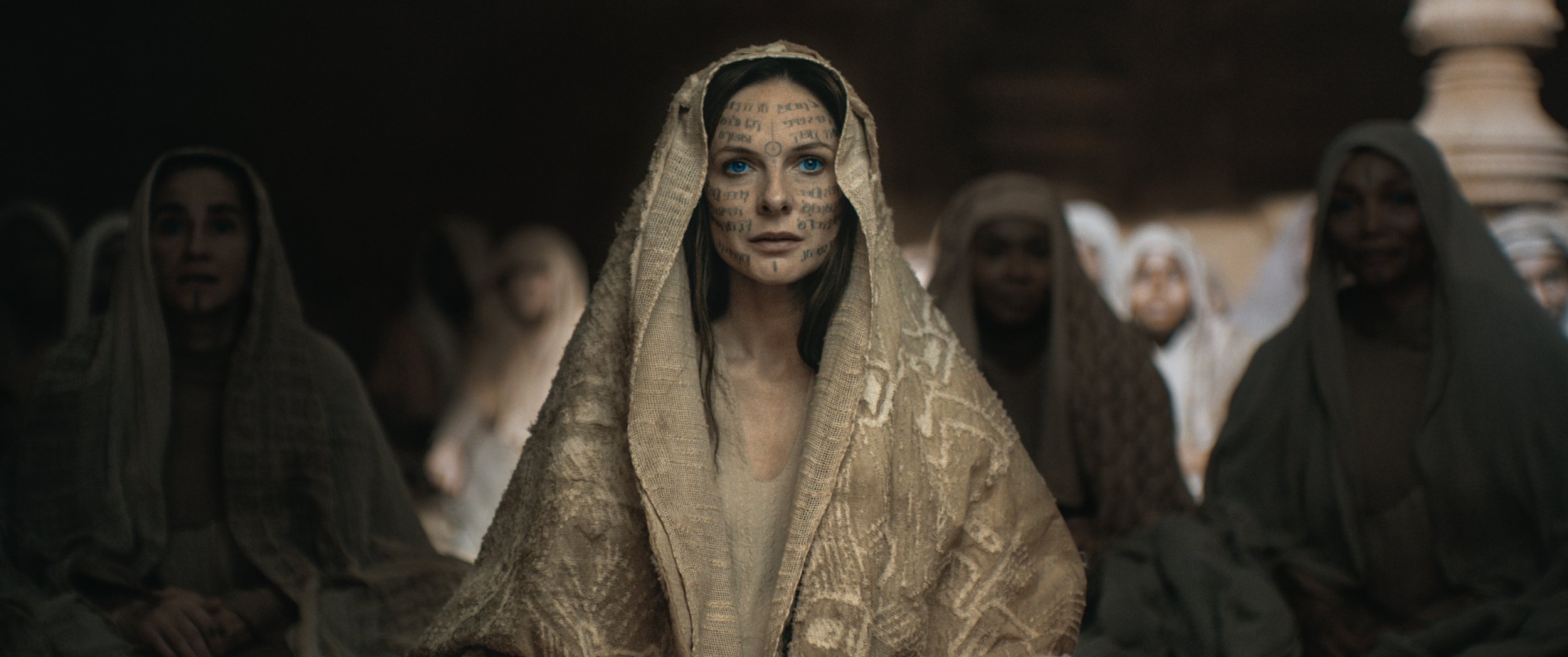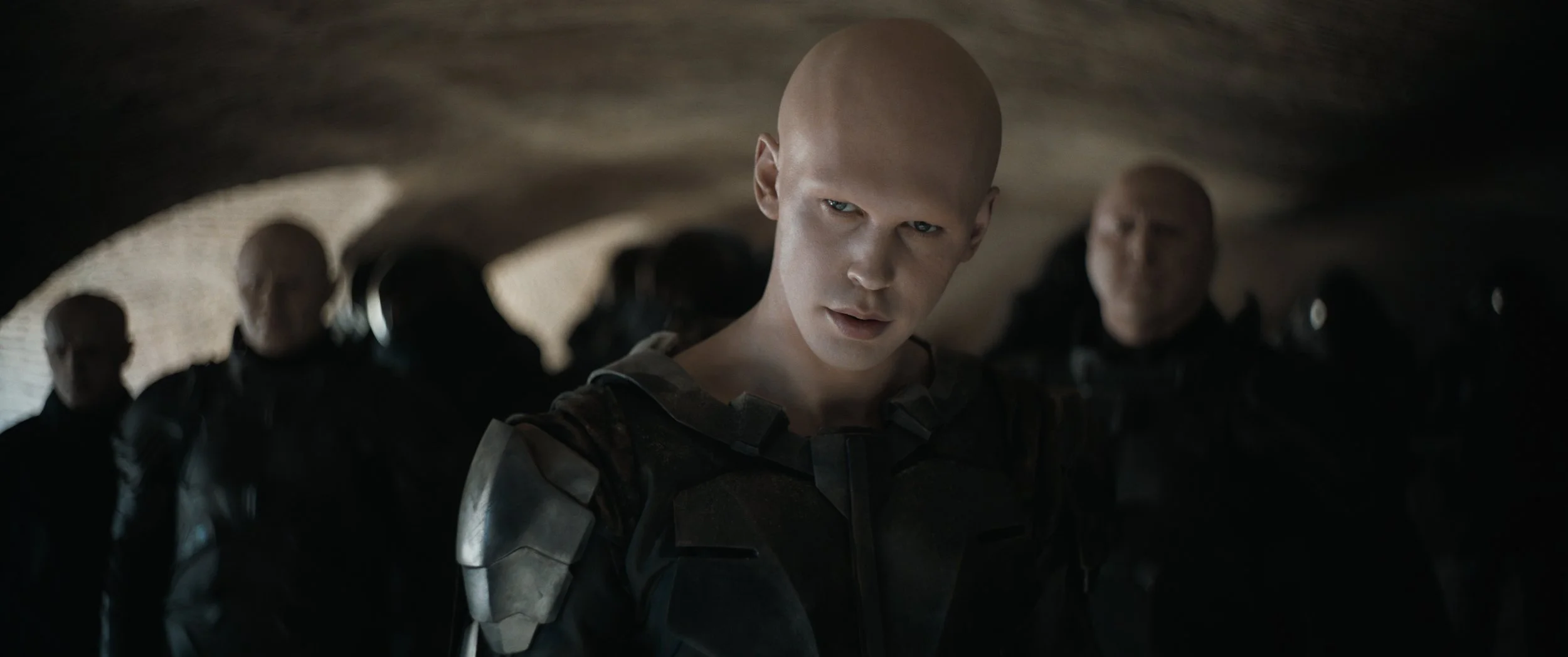'Dune: Part Two' Review: Denis Villeneuve Cooks a Dense Sci-Fi Epic With Bolder Savory Spice
Denis Villeneuve already successfully translated Frank Herbert's Dune to the big screen through a rich, contemporary lens. And while there weren't any doubts that Villeneuve's lightning would strike twice, Paul Atreides's epic tale is paved with higher voltage and Dune: Part Two shocked me to a crisp.
PG13: Sequences of strong violence, some suggestive material and brief strong language
Runtime: 2 Hours and 45 Minutes
Production Companies: Legendary Pictures, Villeneuve Films
Distributor: Warner Bros. Pictures
Director: Denis Villeneuve
Writers: Denis Villeneuve, Jon Spaihts
Cast: Timothée Chalamet, Zendaya, Rebecca Ferguson, Josh Brolin, Austin Butler, Florence Pugh, Dave Bautista, Christopher Walken, Léa Seydoux, Stellan Skarsgård, Charlotte Rampling, Javier Bardem
Release Date: March 1, 2024
Exclusively in Theaters
After Paul Atreides (Timothée Chalamet) defeats Jamis in combat, he and his pregnant Bene Gesserit mother, Lady Jessica (Rebecca Ferguson), are taken under the Fremen's wing. Alongside tribe leader Stilgar (Javier Bardem) and the dubious warrior Chani (Zendaya), Paul learns the Fremen peoples’ ways, fighting amongst them against the Harkonnens’s occupation of Arrakis. As Paul becomes a fearsome warrior known as Muad'Dib, Lady Jessica takes the reins as the Fremen's new Reverend Mother, and she strategizes a plan to instill belief in Paul's Lisan prophecy into reality amongst the Fremen nonbelievers.
Meanwhile, Baron Vladimir Harkonnen's nephew Rabban (Dave Bautista) fails him for the last time. So he hires his deadlier, psychotic brother Feyd-Rautha (Austin Butler) to eliminate Muad'Dib.

Not to start a Dune review with a Star Wars quote, but I don't like sand. I'm a city kid who is not interested in desert-set flicks. With the Arrakis oasis, Villeneuve and cinematographer Greig Fraser made me reconsider my stance because this is some of the most gorgeous imagery I've ever seen in a studio blockbuster flick. From an early immersive sequence revolving around a Harkonnen soldier’s stealth operation to the battle of the two Hollywood “It” boys, Mexican stand-off style, the collaboration between the VFX and camera departments trump the already gorgeous predecessor's lavish quality, constantly throwing picturesque imagery that'll leave your mouth agape. I had a self-imposed “try not to squeal with glee” challenge over the awe-inspiring "Paul riding the sandworm" sequence and I failed. The phenomenal craftsmanship across the board ensures the “Best VFX” Oscar in next year's race.
While I can go on about its spectacular visuals, it's screenwriters Villeneuve and Jon Spaihts' layered concentration on the Fremen people's religious beliefs and power struggle between the hierarchy of the Known Universe that Paul takes center stage. That is where Dune: Part Two comes alive. There's a hindsight appreciation for the writers' restraint with the universe's hierarchy, where the predecessor stored away Princess Irulan (Florence Pugh) and Padishah Emperor Shaddam IV (Christopher Walken) in a toybox to prevent overstuffing the film. Villeneuve and Spaihts organically weave them into the fray with just enough focus. Irulan functions as a narrator and audience avatar, obtaining information from her planet's scheming Reverend Mother/Truthsayer Gaius Helen Mohiam (Charlotte Rampling), essential to Paul and the Fremen's fight. While Florence Pugh is fine as always, Christopher Walken's S-tier casting – specifically his natural voice – fits an Emperor position and matches the weirdness of Herbert's world.
While I found the first installment lacking thematic depth and an emotional layer, the attention towards the formerly underutilized Chani and Stilgar and their opposing ideologies influencing Paul's principles fills that void. Influenced by his Southern-based religion, Stilgar believes that Paul is the prophesized Lisan al Gaib, the chosen "Voice from the Outer World" that'll lead the Fremen to paradise from Harkonnen rule. Chani's northern-based Atheist-like beliefs lie in the idea that her people should be the ones to liberate themselves. Sound familiar, America? Stilgar, who lives in Delulu Land, takes the prophecy to heart, saying, "IT WAS WRITTEN. PAUL IS THE LISAN AL GAIB" if he does so much as sneeze. It doesn't help that Lady Jessica is in the background pulling strings with her new Reverend Mother position to ensure that prophecy becomes a reality.
That's not to say Paul doesn't have his plans for vengeance over his father's murder up his sleeve, but the conflicting morality between his heart and mind adds an immense emotional stake that was missing in the previous film. With all these cards at play, Dune: Part Two cultivates a staggering and close-to-home depiction of how religious influence and the power they invoke are as intertwined as they are flimsy. Those unfamiliar with the book who are too lazy to research, who left the first movie going, “I hate this white savior arc they’re setting up,” are due for a rude awakening.
Dune: Part Two's first half plays as a war flick. Given the time spent with the Fremen, their film advances in deconstructing their culture. Witnessing Paul and Lady Jessica learn their ways lends to better characterization. Javier Bardem's Stilgar is a charming mentor type and a much-needed comic relief that adds fun to the setting's Shakespearean severity. Zendaya – whose previous lack of screentime has been rectified – is this sequel’s emotional anchor. She’s resilient, wearing her humanity and skepticism on her sleeve, having Paul earn her trust and then her love.
But the battle between the Hollywood white boys, Austin Butler and Timothee Chalamet, adds an extra layer of epicness well worth anticipating as they deliver the strongest performances in my eyes.
Dune is Timothée’s franchise, and he confidently holds the picture on his shoulders with conviction and surprising grit, unlike anything he's done in his career thus far. Much like the film's ambitious scope, there's a seismic growth in Paul's character impacted by his taste for blood. As Muad'Dib, Paul's judgments become increasingly unpredictable. Chalamet channels the darkness in his role, becoming a captivating force of nature that changes the entire trajectory of the film's tone. Undeniably, this is a career-best performance, and I am excited to see how he fares in Part Three.
I can't believe I'm saying, "Austin Butler was terrifying," but his work as the intimidating Feyd-Rautha is worth the price of admission. He isn't doing the Elvis voice, as it's closer to Gray Fox from Metal Gear Solid, but his manic presence keeps you at the edge of your seat.

The natural charisma between Zendaya and Timothée Chalamet influences their respective characters’ bond and chemistry, but I would be lying to myself if I didn't think it felt a tad underdeveloped. I needed one more scene of the two getting to know each other or engaging in Fremen's cultural activities to strengthen their romantic beats.

Cooking with that mf savory spice – unlike anyone else has ever done with Herbert’s words – Denis Villeneuve's Dune Part Two is a masterpiece. With added realization and meditation on religion and politics and an emotional centerpiece, it's a damn near-perfect second act that should be regarded as the golden standard of studio blockbuster filmmaking and storytelling.
Rating: 4.5/5 | 93%






